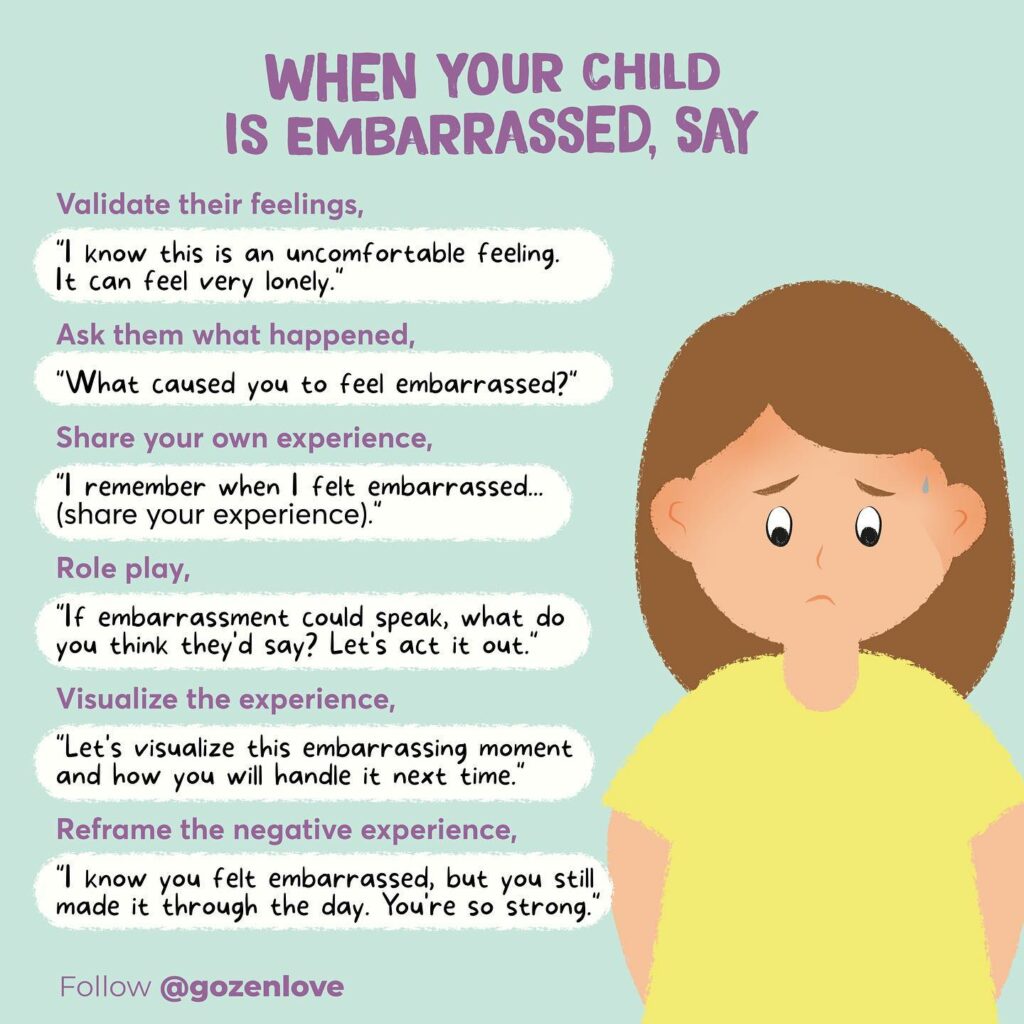Embarrassment is part of the human experience. And yes, it’s really uncomfortable. When our children feel embarrassed, they may retreat and become afraid to interact in everyday life. To avoid future embarrassment, they may avoid speaking up, raising their hand, or socializing with peers.
As compassionate parents, we want to teach our children to embrace the emotions that come with embarrassment and equip them to know how to respond in the future. Here are 6 ways to do just that.
1. Validate their feelings.
“I know this is an uncomfortable feeling. It can feel very lonely.”
When our kids come to us to make sense of their feelings, they need to feel safe. Offering validation helps normalize feelings that are common after embarrassing situations. Help to name feelings like discomfort, loneliness, anxiety, or anger to help kids make sense of their inner world. Remind them that these feelings are normal and won’t last forever.
2. Ask them what happened.
“What caused you to feel embarrassed?”
Before jumping in and immediately offering solutions to remedy their embarrassment, ask some probing questions to help them explore and fully feel their emotions. Letting them share their experience allows them to process each emotion and sort through them individually whether that’s anger, frustration, sadness, or all of the above. Don’t stress about preparing an eloquent set of questions to ask them. Sometimes, just repeating something they said back as a question can help them explore that feeling more deeply. For example:
Child: “It made me feel really sad.”
Parent: “And what about it made you feel really sad?”
3. Share your own experience.
“I remember when I felt embarrassed.”
Most of us can think of a time or two (or three or four) when we said or did something embarrassing. Now would be an ideal time for you to share an experience of your own and show that even Superman is still Clark Kent underneath the suit. Showing this type of vulnerability with our kiddos reminds them that we’re all human and everyone says or does embarrassing things.
4. Role play.
“If embarrassment could speak, what do you think it would say? Let’s act it out.”
As awkward as those can be, the reason role-playing is so important is that it helps build confidence, communication, creativity, and problem-solving. By role-playing an embarrassing scene in a controlled and safe environment, your kids can explore how they might respond and you can also demonstrate and offer ways to handle these situations.
5. Visualize the experience.
“Let’s visualize this embarrassing moment and how you will handle it next time.”
Have your kids visualize or imagine possible embarrassing moments and brainstorm potential responses. Help them practice the words they would say to the people around them and to themselves. Including breathing exercises and grounding techniques to manage accompanying physical sensations can also help them prepare to know what to do should those physical responses arise.
6. Reframe the negative experience.
“I know you feel embarrassed, but you still made it through the day. You’re so strong.”
In the moment, embarrassment can feel like the end of the world. To a child, those feelings can feel catastrophic, overwhelming, and like they’ll never go away. Validate those feelings and then help them to reframe the situation and remind them of the positive things they accomplished. Take a moment to point out how they practiced resilience, courage, and bravery despite the embarrassing experience.
Want to learn more about ways to help your child worry into resilience? Get our free weekly printables at gozen.com/printables.

